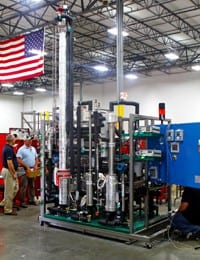
Vacuum distillation is the process of lowering the pressure in the column above the solvent to less than the vapor pressure of the mixture, creating a vacuum, and causing the elements with lower vapor pressures to evaporate off. Lowering the pressure below atmospheric results in lower temperature requirements to achieve evaporation for elements of the distillate, lowering overall heating requirements for the system.
Of course, there are trade-offs – while you can reduce the system temperature requirements, you do have to add equipment (usually a pump) to create the vacuum inside the distillation column. This is where an experienced distillation system designer is a big help; determining which trade-offs in method and equipment will result in the biggest savings overall.
- Example case of a system using a slight vacuum to lower column temperature requirements
- More about distillation column design basics (infographic)
- Next steps for getting a custom distillation system